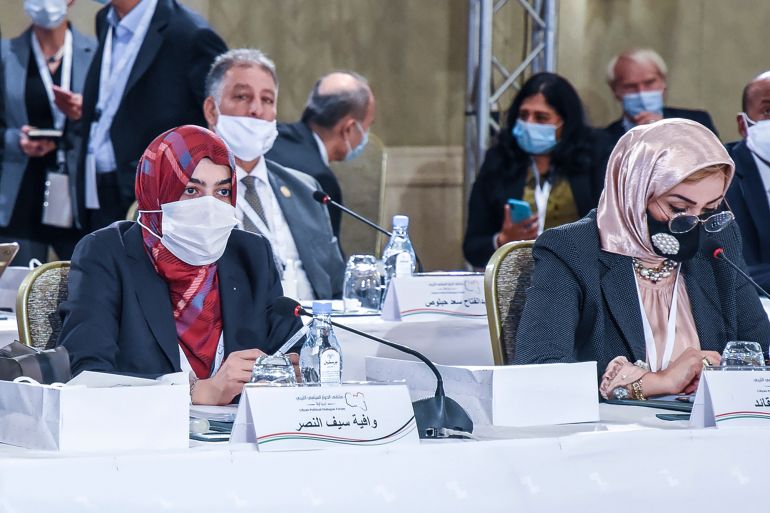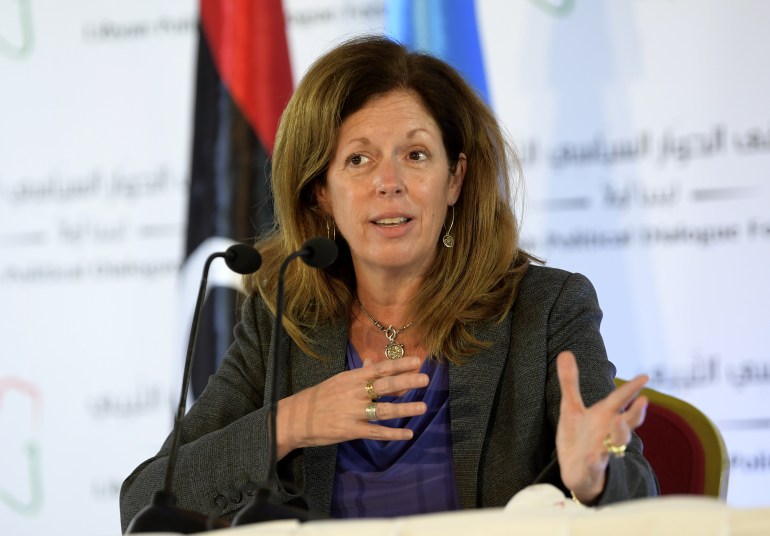Libya talks pause without naming transitional government
Delegates will hold talks online next week to agree on a selection mechanism for a government that will oversee polls.

Talks on Libya’s future have adjourned without naming a new government to oversee a transition to possible elections next year.
But Stephanie Williams, the United Nations envoy for Libya, said on Sunday that she was “very pleased with the outcome” of the talks with 75 delegates selected by the UN to meet in Tunis having agreed to hold presidential and parliamentary elections on December 24 next year.
Keep reading
list of 4 itemsExplainer: Libya‘s war in 500 words
At least 74 migrants dead in ‘devastating’ shipwreck off Libya
Tensions persist as Libya’s warring sides debate road to peace
“The majority in the room do not want the status quo,” Williams said at a news conference after the talks ended.
“This is not an acceptable alternative. It is not sustainable; everybody recognises that. The hard summer that many Libyans passed through – with no electricity, and very little water and all the other hardships and the [coronavirus] pandemic – was really a wake-up call.”
The UN envoy said there was still a lot of work to do and that delegates will resume talks online next week to discuss a reformed structure and role for the executive authority.
They will also discuss the question of a constitutional basis for the election.
“We have agreed to reconvene in about a week in a virtual meeting [to] agree on the selection mechanism for the coming authority,” Williams told journalists.
But she said “no names… were discussed” during the meetings in the capital of neighbouring Tunisia.
She added: “Ten years of conflict cannot be resolved in one week.”

The talks come as part of a wider peacemaking process along with a military ceasefire agreed between the two main sides in the war: the internationally recognised Government of National Accord (GNA) and Khalifa Haftar’s self-styled Libyan National Army (LNA).
However, many Libyans are sceptical about a process that has followed nearly a decade of chaos and bloodshed and repeated previous efforts to resolve the country’s divisions.
Observers have criticised the way the delegates were chosen for the Tunis talks and cast doubts over their clout in a country where two administrations, as well as an array of armed groups and foreign powers, are already vying for power.
Since 2014, the country has been split between rival factions based in Tripoli, the seat of the GNA, and eastern Libya, where the LNA is based.
The GNA emerged from a UN-backed political agreement in 2015, but was spurned by eastern factions. Last year, Haftar launched an LNA offensive on Tripoli that the GNA turned back in June with support from Turkey.
The LNA is backed by the United Arab Emirates, Russia and Egypt.
Jalel Harchaoui, a Libya specialist at the Clingendael Institute in The Hague, warned that foreign interests could easily derail the process.
“The UN’s biggest difficulty is that there are permanent Turkish and Russian military bases and Emirati officers on the ground,” he told AFP news agency.
Harchaoui noted that for an interim executive to be accepted, “there need to be names for each of the main posts”.
“Until this step is fulfilled,” he said, “a deal won’t lead to anything concrete.”